The Quest for Thanksgiving Futbol at Qatar’s World Cup
ALL OVER, Qatar – It’s 10:15 a.m. on Thursday, and in a suburb roughly 20 minutes from downtown Doha, a quest begins. This isn’t just any quest; it’s a search for an ideal, a grand tradition of stuffed faces, high-speed human collisions, inevitable-and-unnecessary political debates and glorious afternoon naps.
I love Thanksgiving, and not for how it came to be, but for what happens on the final Thursday in November and for what it represents. For the stuffing, in two senses. For three NFL games played on the same day in the middle of the week. For family, gratitude, couches, desserts.
Upon waking, the mind flashes to the same place. I’m not home. Not with family. Miss my kids. And, short of some sort of transportive miracle, I won’t see them or watch any NFL football until after returning home. Not to worry. There’s plenty of fútbol, if not football, here; four games on Thursday alone, in fact. Hence the quest.
The plan: traverse Doha and, for one day, avoid geopolitics. Consider Thanksgiving football from a fútbol lens. Meet natives, fans from other countries, the soccer-obsessed and the World Cup descenders. Eat a semi-traditional feast with other journalists, inside of what might be the largest hotel in the world that’s shaped like a torch. Speed to Education City Stadium, with stops of serendipity in between, for Uruguay vs. South Korea. And, eventually, meet up with the Map Man, a person, like me, from Seattle who’s here for the World Cup.
10:20 a.m.
On the morning walk around the neighborhood compound, there are no fall colors, no leftover/rotting pumpkins, no abodes filled with boozy relatives and no signs of a holiday. This is, of course, because there would be no reason for Qataris to celebrate Thanksgiving.
The more relevant question is: have they actually gotten it right?
10:40 a.m.
The mapping of the schedule begins, with Venn Diagram triangulated by Google that suits a certain middle-aged sportswriter’s favorite things. Searches include “coffee and soccer,” “food and football,” and “where can one watch the World Cup and eat a lot.” Shrug.
Try NFL+ one last time, to see if any sort of glitch might allow the subscription to work from 7,000+ miles away. Error code. Again.
Check the schedule the family will half-watch back home, between bites. Bills-Lions. Patriots-Vikings. Giants-Cowboys. Perfect slate.
11:45 a.m.
The bus that ferries writers to The Torch Doha idles in front of our apartment building. But only a few of the seats are filled.
“Does everyone hate Thanksgiving?” someone asks.
Doubtful. These are sports writers and sports broadcasters. If you feed them, they will come. The space fills in a matter of minutes. The bus rumbles down Waidi Al Gaiya Street, past the tailoring shops, the shawarma spots and so many coffee peddlers that there’s even three crowded next to each other in the same plaza.
The herd shuffles inside, through security – and every hotel here has security, like a series of really tall airports. Does it strike anyone as rich that journalists here to write and say critical things about the Qatari’s way of life are heading en masse toward a sumptuous meal borne from a holiday that started with a massacre of indigenous people and their subsequent colonization? Maybe. Probably not.
Such contrast is part of Thursday, inside the torch hotel, where the view outside of the floor-to-cloud glass windows stretches for miles, while most scribes spend the next two hours looking down at their phones. There are elaborate flower displays, multiple check-ins, a series of buffets, juice that’s brightly colored and half sugar, marble floors, ornate ceilings and, for anyone looking up, just-as-ornate carpets hung from the ceiling, only they’re stretched just so, to appear a specific way.
Yes, Thanksgiving brunch in Qatar includes flying carpets overhead.
Buffets fill. U.S. Soccer and Major League Soccer executives give speeches at the event they’re hosting. Reporters sniff—and not for material but food. Also: no one here is talking about the Lions, which is odd, because, for once, sports fans back in America are talking about the Lions.
The buffets open, in all their splendor, and there’s fútbol, as the first game, between Switzerland and Cameroon, kicks off at 1 p.m. local.
The day of fútbol is underway.
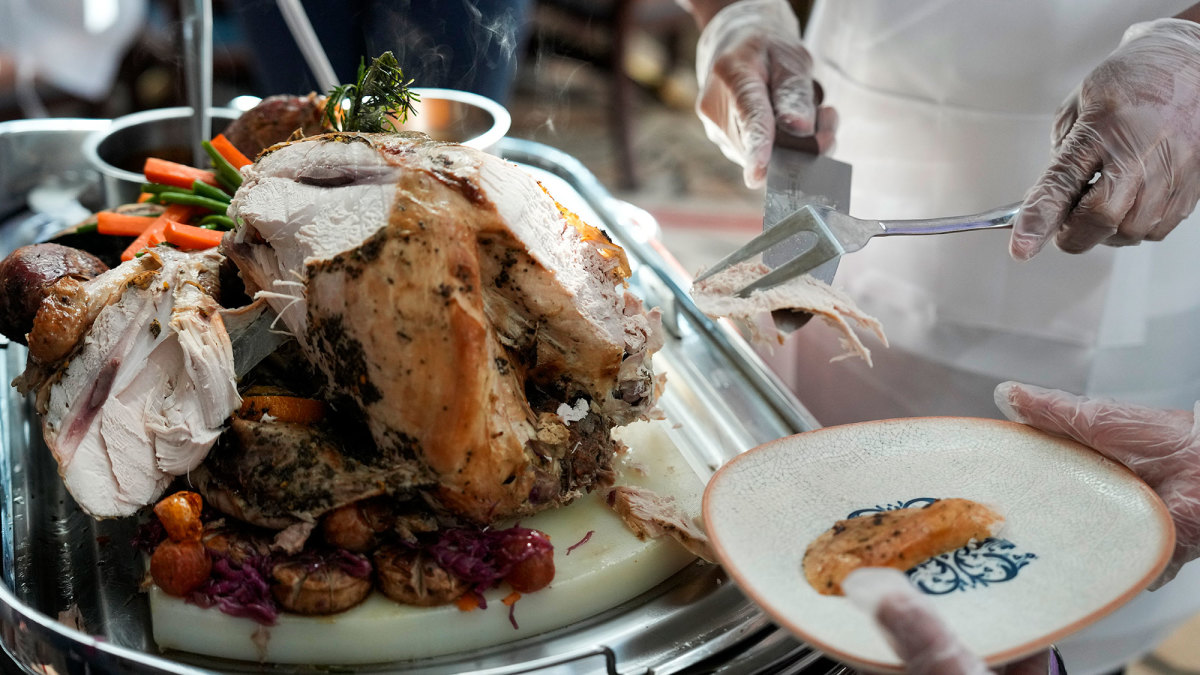
1:37 p.m.
While the Swiss clash with the team that owns the tournament’s best nickname, the Indomitable Lions, Mark Abbott finishes off his first Thanksgiving meal of the day. Abbott isn’t exactly retiring at the end of the year, but he is “stepping down” from his dual MLS titles – president and deputy commissioner.
Surely, Abbott has done Thanksgiving fútbol before, no? He has not, it turns out. He’s like everybody else. Abbott typically spends Thanksgiving morning running in a turkey trot, stopping by a parade and watching the National Dog Show. Then he’ll watch the Cowboys in his family room. His television is not the centerpiece. That prominent perch belongs to his MLS bobblehead collection, row after row of oversized plastic heads resembling famous footballers nodding whenever tipped. “It just got a little out of control,” says the soccer executive of his assortment.
This year, his family is doing an open house instead, with friends and family swinging through. Abbott, though, plans to eat at three turkey feasts in Doha. He’s missing Thanksgiving at home for the first time, and he’s tripling his plates to make up for it: Tower brunch into U.S. Soccer spread into MLS owner soiree.
“I’m going to have to pace myself,” he says, while patting his stomach.
1:55 p.m.
Back outside, back into the relentless heat, and there is a television affixed to a long arm outside a Persian restaurant. Switzerland has taken a 1-0 lead. Six fans sit on a curb, gazing up at the dominance of modern technology. Two others set up in the back of a pickup truck, staring at the same screen from the balcony.
2:30 p.m.
Suddenly, a Thanksgiving oasis seems to reveal itself, in the form of The Al Rifaa Al Turkey restaurant. Alas, tradition is lost in translation. The place is more Turkish than turkey. The waiter apologizes for the lack of television, but hawks the çay tea he serves in a clear glass shaped like a tulip. “What is Thanksgiving?” he asks.
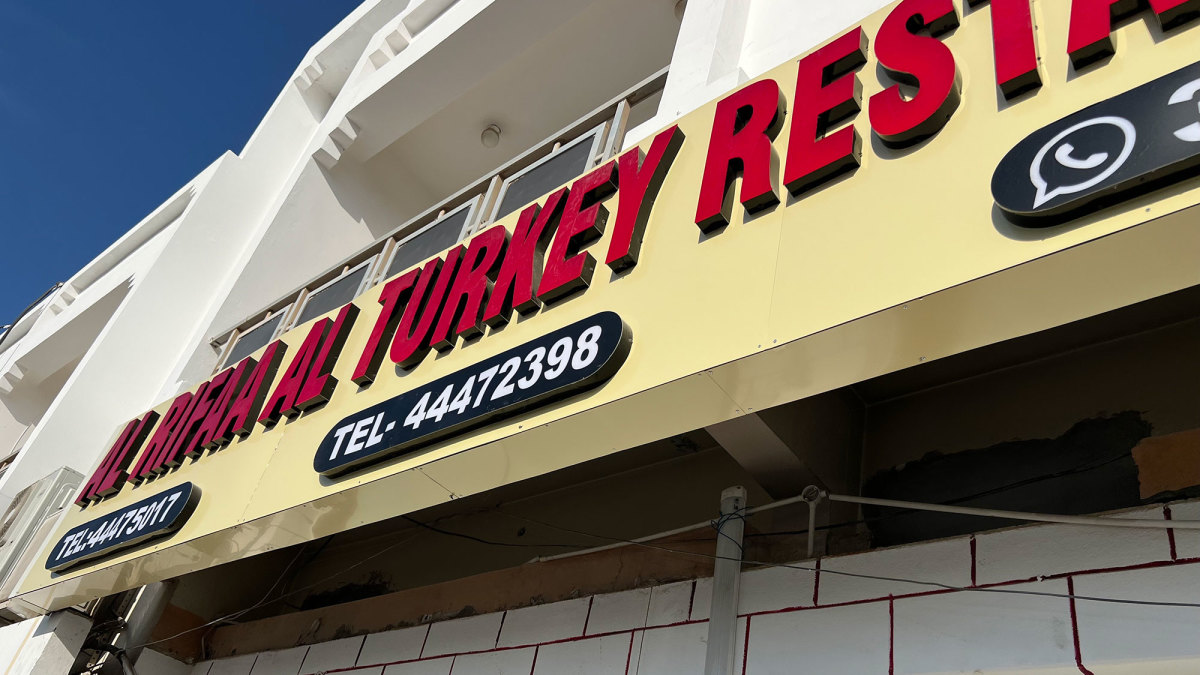
2:46 p.m.
A man sits on the curb nearby. He has kicked off his sandals and leans back against the glass, and his face rests inches from his phone. On the screen: Switzerland, closing in on the first victory of Thanksgiving Fútbol. “Cameroon no good,” he says, holding the phone out for inspection.
3:14 p.m.
The Uber that will slog to Education City Stadium, nearby all the college campuses outside Doha, looks tiny on the map. But it’s visible for the image of a tiny soccer ball affixed to a tiny bumper.
Inside the stadium, the South Koreans roar politely, beating drums and clapping hands, everything rhythmic like a methodical NFL drive. Suddenly, the noise intensifies, as the Taegeuk Warriors shift the ball from the right side of the box to left-center, until it lands at the foot of forward Hwang Ui-jo. His leg winds back like a placekicker about to sail a 50-yard field goal through the uprights. But his momentum, the length of the back swing, sails the ball over a goal presenting ample open space. He puts both hands on his face, incredulous, and then he just starts laughing.
South Korea fights Uruguay to a draw. Given their respective standings, this feels more like a win.
This is what Thanksgiving fútbol looks like in Qatar, what it sounds like and smells like. There’s not a turkey in sight, beyond Uruguay’s celebrated center back, Diego Godín, whose header doinks off the post.
Outside, the stadium’s walls glow red, pink, yellow and blue. It almost resembles a rainbow, which security guards have banned from the stadiums here, lest anyone think they’re as open to marginalized groups as they long ago promised they would be. But it’s not a rainbow. Because rainbows will ruin everything!
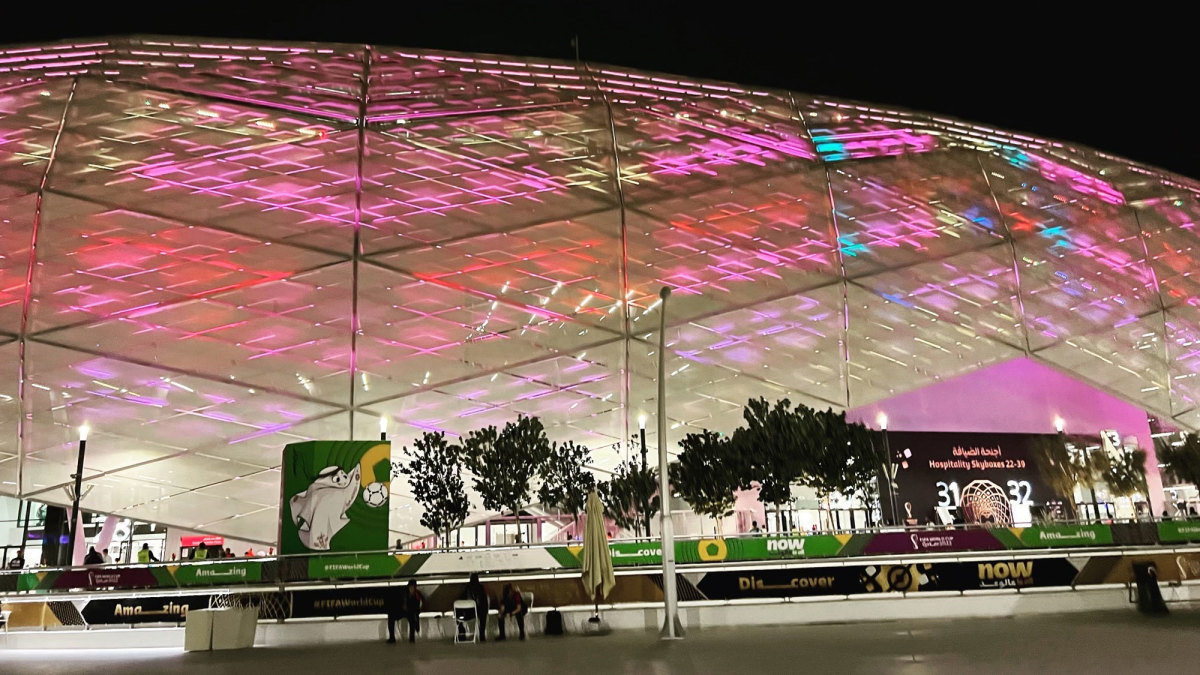
5:05 p.m.
Down the street, past the DJ mixing in the neon booth with no audience nearby, and the pool shimmering in the shadows of the awe-inspiring architecture built for college kids to read, there might be a solution. An answer to what Thanksgiving fútbol means in relation to the football version.
Down the street, in the maze of campuses, lies an unexpected university. It’s where American football is treated, if not exactly like religion, then not unlike religion, either. Welcome to Texas A&M at Qatar. Surely, the denizens get it. Football and turkey. Grandma and gratitude.
Or maybe not. A&M’s campus is mostly empty. There are TVs in lounges but no students. There’s a student center, complete with marble flooring, fast food and a bowling alley, but no football or fútbol to be found.
A group of students sits outside on a bench. You hear them before you see them, because they’re playing “Gangsta’s Paradise” (RIP Coolio) at a volume so loud it threatens to shake the walls of the pristine, diamond-shaped Qatar National Library nearby. Yes! They must know. They’re sitting nearby pool tables and foosball tables, bumping a classic at ear-splitting decibels and smoking.
“Anybody from the States?”
One spits at the ground. “No.”
“Anyone watching football? Fútbol.”
Spit.
“We ain’t watching s—t.”
Never has anyone felt older in their life than at that very moment. It doesn’t seem like a good time to point out that the Aggies, in a season of high expectations, are 4-7, dead last in the SEC.
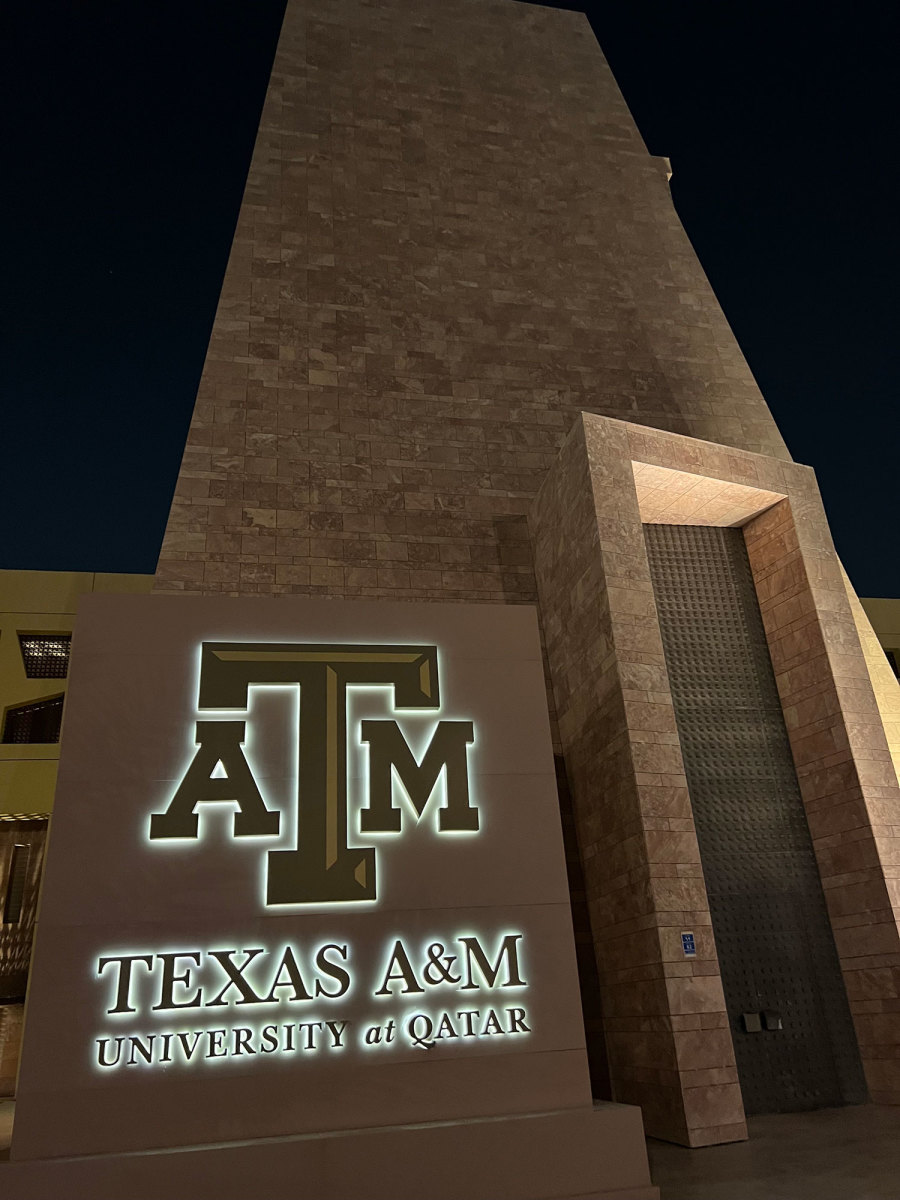
7:21 p.m.:
Uber. Stuck in traffic. Eyes feel heavy, then droopy. They close.
A Thanksgiving tradition like none other is completed.
7:34 p.m.:
After almost an hour in traffic, the driver stops his car. Says something that’s hard to understand but translates to, get out of here, can’t handle this. It’s dark outside. Soon, NFL football will start. The street looks familiar. We’re back to where we started!
In some ways, it’s vintage Thanksgiving: high hopes, anticipation building, too fast out of the gate, too full, collapse in exhaustion, then wake up in the neighborhood of grateful. This quest, though, is a bust.
And then …
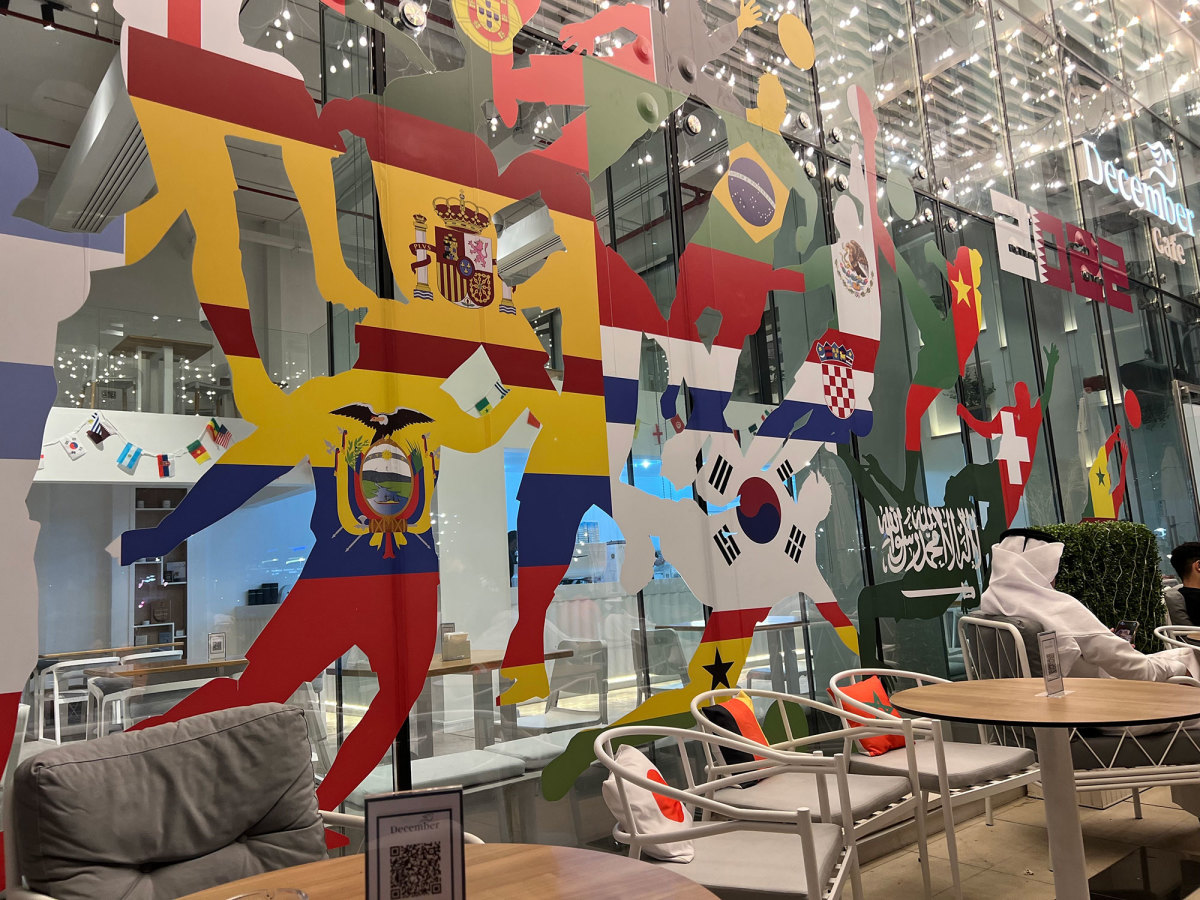
7:42 p.m.
There it is. An outdoor plaza, attached to one of the dozens of malls in Doha. A sign, featuring two soccer balls, a heart and 2022. A restaurant, December, for a holiday that’s almost attached to the same calendar page. And a game, between Portugal and Ghana, that electrifies an audience seated outside, around a flat screen, drinking Spanish lattes and fresh-squeezed orange juice, while Khalifa International Stadium and the tower hotel glimmer in the distance.
Fans stand. Fans sit. Fans pace.
Images of soccer stars are affixed to the walls; only, instead of jerseys, their midsections are covered in national flags. So are the pillows on the seats, for Germany and Japan and Canada and England and the rest.
An email arrives. It’s from Ryan Holiday, a friend and stoic philosopher. It’s about gratitude, with a twist, about embracing war and evil and stress. There’s a quote from the writer Jorge Luis Borges. It reads, in part, “A writer — and, I believe, generally all persons — must think that whatever happens to him or her is a resource. All things have been given to us for a purpose, and an artist must feel this more intensely.”
That’s Qatar. That’s covering this World Cup. That’s the quest.
My dad, a former high school football coach, calls from Florida. A slice of home. The torch blinks green. Lions-Bills will kick off soon.
“You’re doing what?”
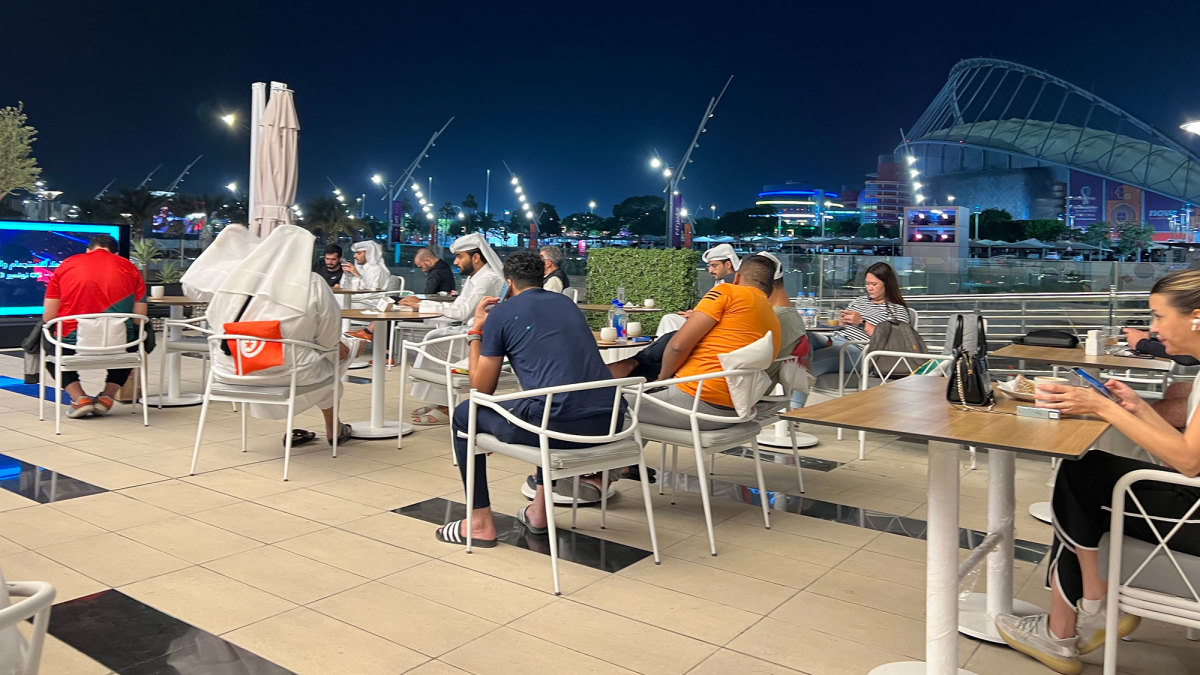
Portugal scores, and the crowd rises and claps and roars. Cars nearby honk their horns. One server is from Ghana, and while she’s watching and selling flat whites, she’d rather be home, with friends. But the game is on, she says. It’s not so bad. Her country scores. Her smile says, it could be worse.
Portugal scores again, and a man from that country, who works in this mall, stands and rips a Tiger Woods fist pump. A kid nearby hugs his dad. The man from Portugal sits down and clenches his fists. Again, another goal, he’s up, pumping both fists this time, almost dancing forward, strutting head back, gulping in not air but pure, unaltered joy. Ghana scores again, but Portugal wins, and the television shows a Portuguese supporter in a headdress at the stadium. Tears stream down his cheeks.
That’s the point, right? The moment. The connection. For all the sportswashing, the global implications, the government here that seems to care little for basic human rights and the problems in Qatar that must be solved, there’s this. It’s all there, the best and the worst. But the worst is not the only thing that exists at this tournament. It’s the most important. But the gratitude comes from knowing that and finding joy anyway, then using that injection of hope to work for change.
9:10 p.m.
Map Man sends a direct message. Come to the swanky W Hotel downtown. U.S. supporters there are having a party. There is a DJ. A VIP room. Neon lights and cowboy hats and red carpet and Budweiser, which tastes, after 12 days here, surprisingly delicious.
This man, Ed Ball, is burly, friendly and from Seattle. Most weeks, he works as an aerospace salesman and lives with his wife, Sarah Graber, just south of downtown. We’re all from roughly the same place, but nearly 7,400 miles away. He chugs a Budweiser from a smaller replica of the tournament trophy. Then we leave the party and cross the street and sit down outside, at a Thai restaurant at another hotel that serves booze.
Theirs is a soccer union. Both played in college, at lower levels. Both follow the U.S. national Team. When they first met, Sarah found it odd that Ed looked up her statistics; not height but goals scored. This did not deter him, because Ed is not the type to be deterred. After trying karaoke while living in Japan, he hosted weekly sessions on the mic. After deciding he liked kickball, he started his own team and joined a competitive league. One day, in 2014, he resolved to push “Weird Al” Yankovic for the Super Bowl halftime show, and while he didn’t actually succeed, he garnered national attention, hearing from both Weird Al and the league.
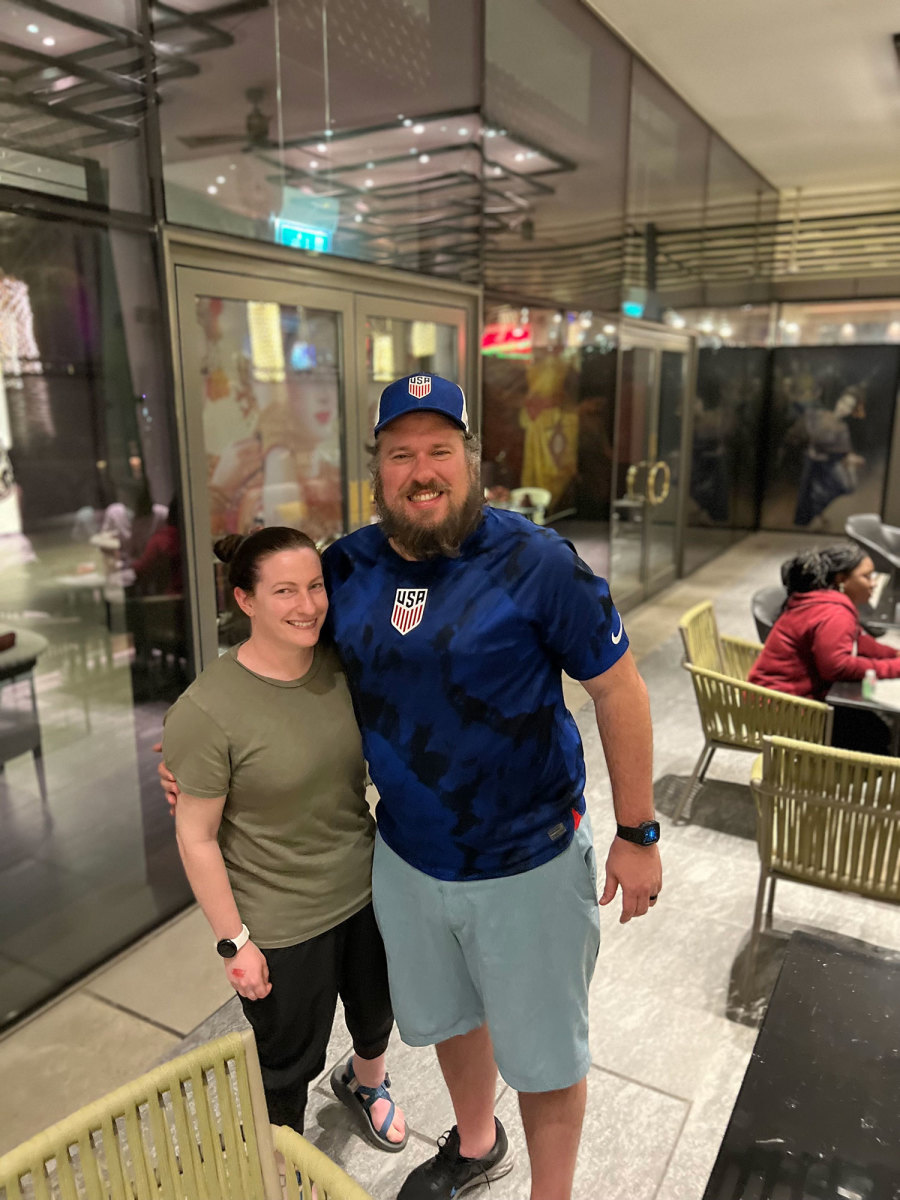
While dating, they traveled together to Brazil for the World Cup. While married, they traveled to Russia for that Cup and a second honeymoon of sorts. Before heading there, Ed created a map of sites and restaurants they planned to visit. It led them to the best chocolate shop, they believe, in the world. This time, because Ed is partial to hops, he made a beer map, and that beer map has spread all over. Yahoo! Sports wrote about its momentum, and from there, his popularity surged. People called him a hero, the man who saved the World Cup. He’s low-key famous here, to which Sarah can only roll her eyes.
But there it is again – community, friendship, fellowship – Thanksgiving ideals, at their core. Whether through beer or turkey or Weird Al tunes, it still matters. We all sat down to dinner. And, near the end, we all realized that this was, essentially, Thanksgiving for the three of us. Home and not anywhere close. Grateful, too.
Most years, they spend the holiday in Durango, Colorado, with her parents, while debating pro football in Texas, because Ed loves the Cowboys and Sarah’s family is partial to the Texans.
Meanwhile, Brazil topped Serbia, 2-0, and Thanksgiving Fútbol, World Cup edition, came to an end.
Ed and Sarah head back to their hotel. The Cowboys will soon clash with the Giants, and the map man wants to see if he can catch any of the game, then fall asleep in something like hop heaven.
